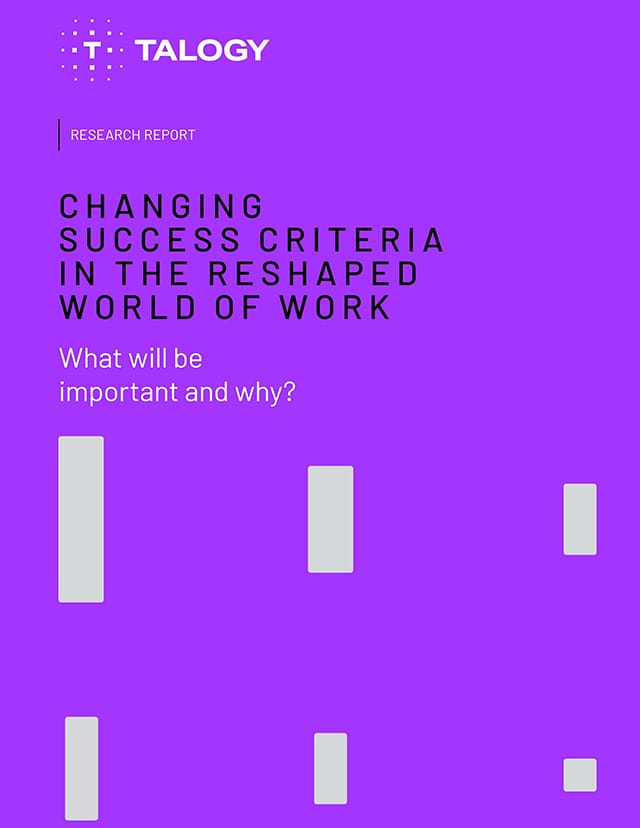Written by Mary Mescal, Managing Research Consultant
In this blog, I will explore two additional top competencies from our recent report, Key success criteria in the reshaped world of work, which relate to how we create and enable change and make decisions: learning agility and critical thinking at work.
Learning agility
Over the past few years, we have all had to adapt, adjust, and rethink how we do our jobs in a very different environment. It has pushed us to learn quickly and to figure out what is effective and ineffective when adapting to the changes in this reshaped world of work.
Aside from the changes that the pandemic and remote/flexible working have brought, we already know that the context and nature of work is changing rapidly. The fast pace of technological change is reshaping the nature of many jobs and it will be necessary for us to evolve. We will have to learn new skills and ways of working in order to keep up with this change and to reap the benefits that new technologies can provide.
Experts at the Institute for the Future (Workshop) have outlined that “85% of the jobs that today’s learners will be doing in 2030 haven’t been invented yet.” Arguably, some of those roles may be adaptations or relabeling of current jobs. However, there is no denying that this technological evolution is already bringing about a big shift in job automation and displacement of roles. With that comes job creation and the changing of the types of skills required from employees.
People are going to need to be able to reskill rapidly, adjust to new ways of working on an ongoing basis, and essentially get accustomed to ‘learning in the moment.’ According to the World Economic Forum’s Future of Jobs Report 2020, 94% of business leaders report that they expect employees to pick up new skills on the job. This is a sharp increase from the 65% reported in 2018.
This will require people to develop their capacity for learning agility which we define as being able to critically evaluate experiences, learn quickly from outcomes and feedback, and apply this learning in new situations to determine better approaches.
Tips for learning agility
- Ask for feedback on how you have handled specific situations – both what worked well and what did not. Consider how to best change your approach in the future when a similar situation arises.
- When encountering a new situation, identify its key characteristics. Then think about previous situations where you have encountered those same characteristics even if in a different context or role. Use relevant insights from your prior experience to maximize your probability of success in the new context.
- Continuously reflect and evaluate. Applied learning is critical to determine better approaches and ways of working. When a new approach is successful, consider why and how you may be able to leverage it in the future. When it is unsuccessful, think through why that was the outcome, and determine if that approach could work in other situations or contexts.
Critical thinking
The World Economic Forum’s Future of Jobs Report 2020 also listed critical thinking and analysis skills as increasing the most in terms of organizational demand.
The rapid pace of technological advances has brought an increasing use and implementation of things such as cloud computing, big data and analytics, and artificial intelligence (AI) within organizations. This brings with it access to large amounts of data and information that can help us navigate business issues. However, these advances by nature can often be very complex and require organizations to have employees with the knowledge to make sense of information from multiple sources. Additionally, they must weigh the pros and cons of potential solutions and solve complex problems, particularly as we navigate the changing and often ambiguous nature of work.
The pandemic has also forced many organizations to rethink their purpose, strategy, and direction. Most organizations will need to innovate to some degree in response to the changes brought about by the pandemic. Deloitte found that organizations that identified as being ‘high innovators’ consider critical thinking to be the skill they are working hardest to develop within their workforce. The rationale being that while technology is bringing advances in terms of being able to provide useful information, we still require the human skill of judgment and critical thinking to make sense of this information. People need to be able to interpret and pick apart complex data, provide recommendations, and take action that will deliver real impact and enable innovation for the organization.
We define critical thinking as being able to gather and appraise information from a range of sources, identify relevant from irrelevant information, and actively and objectively question ideas, conclusions, and assumptions.
Tips for critical thinking
- Resist rushing to conclusions. Naturally, time isn’t always on our side. However, jumping to action too quickly or rushing to make decisions can often result in the wrong course of action being taken. To achieve the best outcome, you should gather input from your stakeholders, perform research to confirm what you heard, and cross-verify data to ensure you have a complete picture.
- Consider the broader context. Often, we can fall into the trap of working with tunnel vision, determined to find a solution to a specific problem or need. Sometimes a solution can have ripple effects elsewhere and ultimately may have more negative than positive consequences. When you are faced with a problem, don’t just focus on the immediate issue in isolation. What other factors contribute to the issue and what impact does the issue have on other areas?
- Remain objective. Discipline yourself to conduct research so you know and understand the facts of the situation. You may have valid feelings or intuition based on experience, but you still need evidence to support your case. Avoid making decisions based on assumptions.




